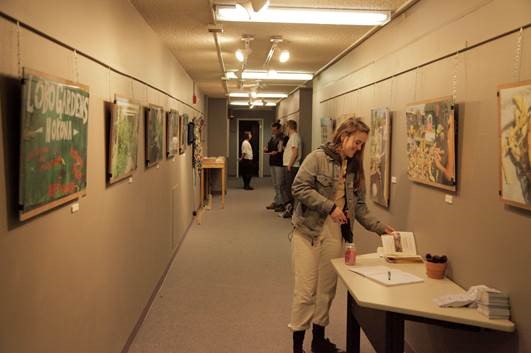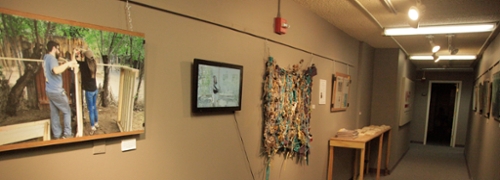CARC Gallery show tells history of Lobo Gardens
 A show in the gallery at the Center for Advanced Research Computing (CARC) chronicles the history of the Lobo Gardens project, which transforms gardens around the University of New Mexico campus into learning laboratories and evokes the state’s agricultural heritage.
A show in the gallery at the Center for Advanced Research Computing (CARC) chronicles the history of the Lobo Gardens project, which transforms gardens around the University of New Mexico campus into learning laboratories and evokes the state’s agricultural heritage.
Lobo Gardens, An Exhibition: Rethinking Relations is now at the gallery in CARC, located at 1601 Central Ave. NE. The exhibition includes photographs by Volunteer in Service to America Noel Mollinedo and from the project archives, a video presentation about the project, and a weaving and plaster reliefs with natural items found in the gardens.
Mollinedo quoted long-time Lobo Gardens faculty supporter Tema Milstein: “Not too many generations ago, we all grew our own food - planting, harvesting, building, digging. We knew where our food came from and that’s essential to our ongoing relationship to the land.” Milstein is an associate professor of the geography and environmental studies department.
 Mollinedo works with Milstein to coordinate the garden project and is organizing the CARC gallery show. Mollinedo majored at UNM in art and ecology and graduated with a Bachelor of Fine Arts degree. He is one of two volunteers through a partnership with STEAM New Mexico hired to work on the project, with an eye on long-term sustainability of the gardens.
Mollinedo works with Milstein to coordinate the garden project and is organizing the CARC gallery show. Mollinedo majored at UNM in art and ecology and graduated with a Bachelor of Fine Arts degree. He is one of two volunteers through a partnership with STEAM New Mexico hired to work on the project, with an eye on long-term sustainability of the gardens.
Lobo Gardens is a model for community gardens, a fast-growing trend in universities and communities across the country, he explained. There are two main gardens on the UNM campus: the RED Garden near the UNM Real Estate Department, and the Hokona Garden outside the Hokona dorm.
The first Lobo Garden began in 2010 as a hands-on, real-life lesson in gardening, community relations, and food sustainability. The project was started by Seeds of Rebellion, a student-led initiative, and the Research Learning Service Program, and is now spearheaded by Community Engaged Learning Research (CELR).
The project provides a fully rounded course in planning, designing, preparing, planting, and maintaining the gardens, as well as fostering student cooperation in all disciplines and community outreach. Students majoring in a wide variety of fields benefit from the program because it gives them experience and perspective outside of their usual areas of study. The collaboration between STEAM and gardening both offer new educational models to learning traditional subjects, making them good partners, Mollinedo said.
Andrea Polli, UNM professor of Arts and Ecology and Social Media Workgroup director, oversees the project and CELR director Monica Kowal sponsored the show.


